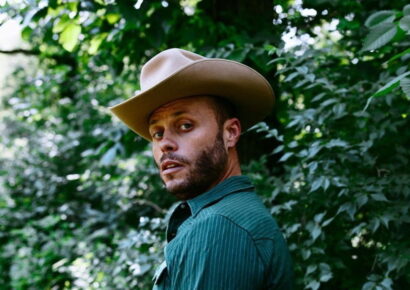Melbourne-based Abe Dunovits has been making music for decades and he is releasing his newest album, Calypso Love, this month.
Abe is a self-producing one-man band — doing his own writing, arranging, recording, producing, mastering and managing. He’s also a self-proclaimed “naughty experimentalist” with a skill and passion for diving into the unknown.
Calypso Love is the product of these ambitious endeavours. As Dunovits says, “I’ve been trying to experiment with this fusion of different sounds and rhythms.” Earlier in his musical career, his sound was informed by early rock and roll, blues, classical, Spanish, South American, and African folk music styles and you can see all of these in his recent work.
Keep up with the latest music news, features, festivals, interviews and reviews here.
Dunovitz is deeply inspired by the instruments he comes across, often creating different album concepts around them, such as the mandolin in Saved by the Taco Belle and the charango in Charango Unchained. After developing an interest in a new instrument, he finds music flows through him in a new and unusual way.
On his newest project, Calypso Love, he’s fixed his attention on the banjo, weaving acoustic earthy grooves in different time signatures and creating jangly melodies.
This is complemented by ukuleles and Afro-Latin percussion to create a rich empathic tapestry of familiar folky sounds in songs about resilience, identity, honesty, self-love, mental health, inclusivity and vulnerability. These themes are done in a vibrant, dynamic way with a range of different grooves and styles in the album.
About his newest project, Dunovits says, “It’s a happy album and it’s therapeutic in a way that makes me feel good about myself and my contribution to music.” Much of the album is fun and cheerful, and the island vibes kick off the summer in a fresh new way.
Dunovits was inspired by calypso music – a style of Carribean music characterised by highly rhythmic and harmonic vocals. “It’s very simple and direct, and the lyrics tend to be very comical and political or a combination of both.” The style fits Dunovits as it is intuitive and experimental and he draws a lot of his inspiration from calypso while simultaneously making it his own.
Much like calypso music that is found in Costa Rica, many of the songs on Calypso Love blend English and Spanish. Dunovits’ first language is Spanish. This is because, before spending most of his life in Australia, he spent his early years in the oppressive military regime of Argentina — fleeing poverty with his family and a one-way ticket to Madrid. It was in Spain that he encountered the blossoming social, art, and music scene of the early 80s.
Dunovits knows that many Australian listeners prefer songs in English. When he writes songs in Spanish, people can’t always gauge the full message and power of his lyrics.“With music and lyrics and poetry, it’s really hard to translate,” he says, “The language carries the feeling and the meaning. It’s hard to fully translate and understand the power of the language.”
Despite this, Dunovits continues to write many of his songs in Spanish and English. He’d rather write in a way that feels authentic to him than try to appease others.
Going into his songwriting process, he says, “I’m just gonna do it and the way it comes out, it comes out.” His English songs enable him to connect with his listeners and combine styles, while Spanish lyrics allow him to piece together words in a unique and natural way.
One of his favourite songs on the album is Nada. The premise is based on a sitcom reference and he worked with his partner to record the introduction. The line is repeated throughout the song with adlibs and an energetic banjo.
Calypso Love is far different from his other solo album, Sigh of the Times, which he wrote, produced, and released in the 2020 Melbourne lockdown. This album was inspired by his dad going into care from dementia and his passing.
While each album captures very different moments, they both show the way that Dunovits uses his music to express how he feels and take a snapshot of the present moment. “You make music to leave a legacy of your time on Earth and the time you spend being alive,” he says. Calypso Love represents more of a celebration of life, love and resilience.
While Dunovits is, in many ways, a one-man band, he recognizes that he couldn’t produce his music without his partner, family, and friends. They encourage him to do what he loves while focusing on what matters – his passion, message and the community.
Keep up with Abe Dunovits here.







